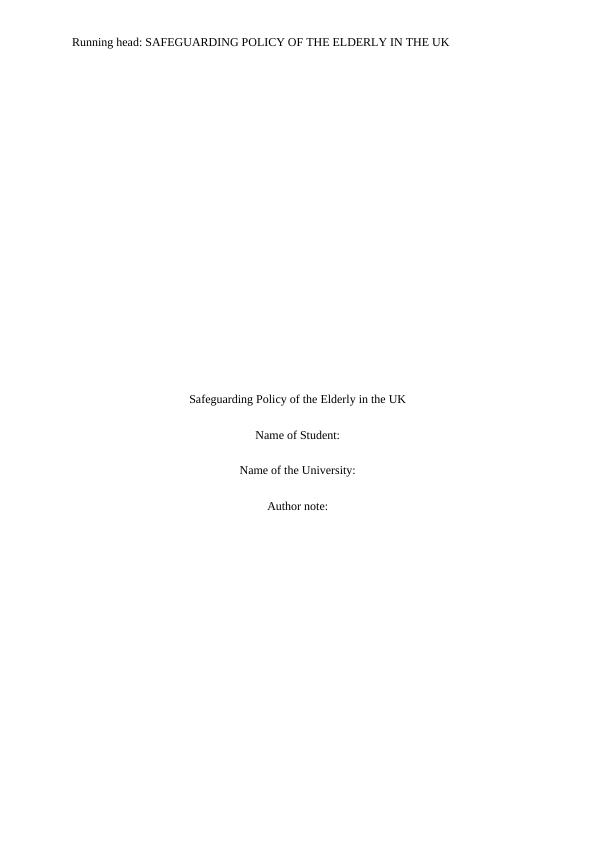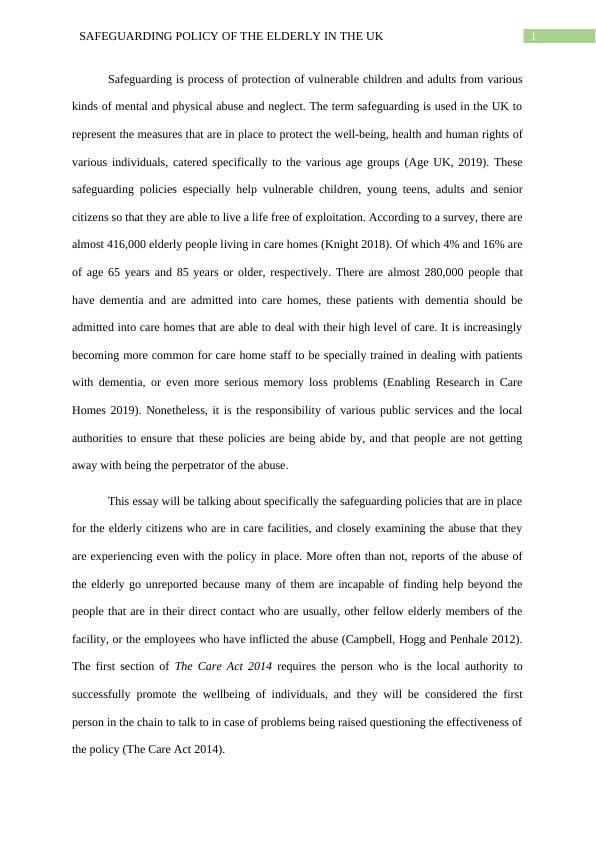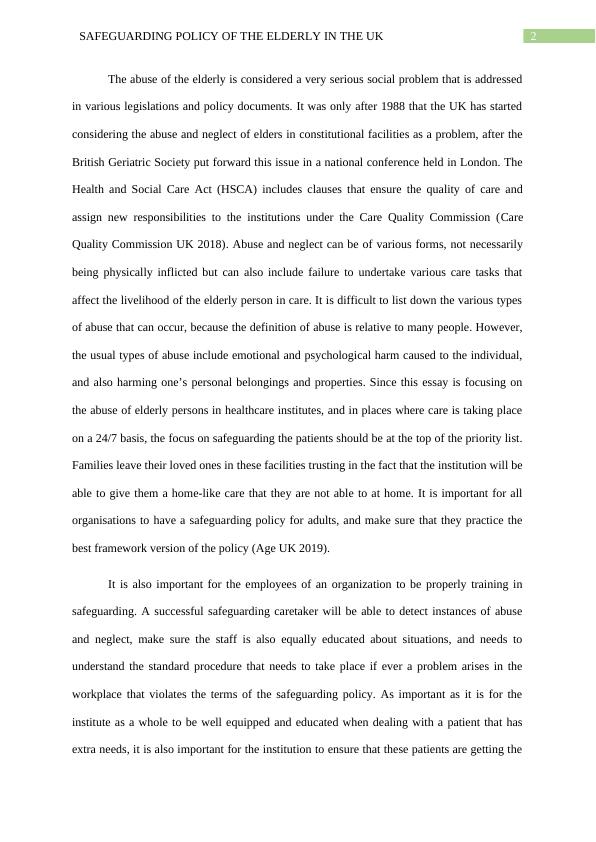Safeguarding Policy of the Elderly in the UK
Added on 2023-04-23
8 Pages2442 Words94 Views
Running head: SAFEGUARDING POLICY OF THE ELDERLY IN THE UK
Safeguarding Policy of the Elderly in the UK
Name of Student:
Name of the University:
Author note:
Safeguarding Policy of the Elderly in the UK
Name of Student:
Name of the University:
Author note:

1SAFEGUARDING POLICY OF THE ELDERLY IN THE UK
Safeguarding is process of protection of vulnerable children and adults from various
kinds of mental and physical abuse and neglect. The term safeguarding is used in the UK to
represent the measures that are in place to protect the well-being, health and human rights of
various individuals, catered specifically to the various age groups (Age UK, 2019). These
safeguarding policies especially help vulnerable children, young teens, adults and senior
citizens so that they are able to live a life free of exploitation. According to a survey, there are
almost 416,000 elderly people living in care homes (Knight 2018). Of which 4% and 16% are
of age 65 years and 85 years or older, respectively. There are almost 280,000 people that
have dementia and are admitted into care homes, these patients with dementia should be
admitted into care homes that are able to deal with their high level of care. It is increasingly
becoming more common for care home staff to be specially trained in dealing with patients
with dementia, or even more serious memory loss problems (Enabling Research in Care
Homes 2019). Nonetheless, it is the responsibility of various public services and the local
authorities to ensure that these policies are being abide by, and that people are not getting
away with being the perpetrator of the abuse.
This essay will be talking about specifically the safeguarding policies that are in place
for the elderly citizens who are in care facilities, and closely examining the abuse that they
are experiencing even with the policy in place. More often than not, reports of the abuse of
the elderly go unreported because many of them are incapable of finding help beyond the
people that are in their direct contact who are usually, other fellow elderly members of the
facility, or the employees who have inflicted the abuse (Campbell, Hogg and Penhale 2012).
The first section of The Care Act 2014 requires the person who is the local authority to
successfully promote the wellbeing of individuals, and they will be considered the first
person in the chain to talk to in case of problems being raised questioning the effectiveness of
the policy (The Care Act 2014).
Safeguarding is process of protection of vulnerable children and adults from various
kinds of mental and physical abuse and neglect. The term safeguarding is used in the UK to
represent the measures that are in place to protect the well-being, health and human rights of
various individuals, catered specifically to the various age groups (Age UK, 2019). These
safeguarding policies especially help vulnerable children, young teens, adults and senior
citizens so that they are able to live a life free of exploitation. According to a survey, there are
almost 416,000 elderly people living in care homes (Knight 2018). Of which 4% and 16% are
of age 65 years and 85 years or older, respectively. There are almost 280,000 people that
have dementia and are admitted into care homes, these patients with dementia should be
admitted into care homes that are able to deal with their high level of care. It is increasingly
becoming more common for care home staff to be specially trained in dealing with patients
with dementia, or even more serious memory loss problems (Enabling Research in Care
Homes 2019). Nonetheless, it is the responsibility of various public services and the local
authorities to ensure that these policies are being abide by, and that people are not getting
away with being the perpetrator of the abuse.
This essay will be talking about specifically the safeguarding policies that are in place
for the elderly citizens who are in care facilities, and closely examining the abuse that they
are experiencing even with the policy in place. More often than not, reports of the abuse of
the elderly go unreported because many of them are incapable of finding help beyond the
people that are in their direct contact who are usually, other fellow elderly members of the
facility, or the employees who have inflicted the abuse (Campbell, Hogg and Penhale 2012).
The first section of The Care Act 2014 requires the person who is the local authority to
successfully promote the wellbeing of individuals, and they will be considered the first
person in the chain to talk to in case of problems being raised questioning the effectiveness of
the policy (The Care Act 2014).

2SAFEGUARDING POLICY OF THE ELDERLY IN THE UK
The abuse of the elderly is considered a very serious social problem that is addressed
in various legislations and policy documents. It was only after 1988 that the UK has started
considering the abuse and neglect of elders in constitutional facilities as a problem, after the
British Geriatric Society put forward this issue in a national conference held in London. The
Health and Social Care Act (HSCA) includes clauses that ensure the quality of care and
assign new responsibilities to the institutions under the Care Quality Commission (Care
Quality Commission UK 2018). Abuse and neglect can be of various forms, not necessarily
being physically inflicted but can also include failure to undertake various care tasks that
affect the livelihood of the elderly person in care. It is difficult to list down the various types
of abuse that can occur, because the definition of abuse is relative to many people. However,
the usual types of abuse include emotional and psychological harm caused to the individual,
and also harming one’s personal belongings and properties. Since this essay is focusing on
the abuse of elderly persons in healthcare institutes, and in places where care is taking place
on a 24/7 basis, the focus on safeguarding the patients should be at the top of the priority list.
Families leave their loved ones in these facilities trusting in the fact that the institution will be
able to give them a home-like care that they are not able to at home. It is important for all
organisations to have a safeguarding policy for adults, and make sure that they practice the
best framework version of the policy (Age UK 2019).
It is also important for the employees of an organization to be properly training in
safeguarding. A successful safeguarding caretaker will be able to detect instances of abuse
and neglect, make sure the staff is also equally educated about situations, and needs to
understand the standard procedure that needs to take place if ever a problem arises in the
workplace that violates the terms of the safeguarding policy. As important as it is for the
institute as a whole to be well equipped and educated when dealing with a patient that has
extra needs, it is also important for the institution to ensure that these patients are getting the
The abuse of the elderly is considered a very serious social problem that is addressed
in various legislations and policy documents. It was only after 1988 that the UK has started
considering the abuse and neglect of elders in constitutional facilities as a problem, after the
British Geriatric Society put forward this issue in a national conference held in London. The
Health and Social Care Act (HSCA) includes clauses that ensure the quality of care and
assign new responsibilities to the institutions under the Care Quality Commission (Care
Quality Commission UK 2018). Abuse and neglect can be of various forms, not necessarily
being physically inflicted but can also include failure to undertake various care tasks that
affect the livelihood of the elderly person in care. It is difficult to list down the various types
of abuse that can occur, because the definition of abuse is relative to many people. However,
the usual types of abuse include emotional and psychological harm caused to the individual,
and also harming one’s personal belongings and properties. Since this essay is focusing on
the abuse of elderly persons in healthcare institutes, and in places where care is taking place
on a 24/7 basis, the focus on safeguarding the patients should be at the top of the priority list.
Families leave their loved ones in these facilities trusting in the fact that the institution will be
able to give them a home-like care that they are not able to at home. It is important for all
organisations to have a safeguarding policy for adults, and make sure that they practice the
best framework version of the policy (Age UK 2019).
It is also important for the employees of an organization to be properly training in
safeguarding. A successful safeguarding caretaker will be able to detect instances of abuse
and neglect, make sure the staff is also equally educated about situations, and needs to
understand the standard procedure that needs to take place if ever a problem arises in the
workplace that violates the terms of the safeguarding policy. As important as it is for the
institute as a whole to be well equipped and educated when dealing with a patient that has
extra needs, it is also important for the institution to ensure that these patients are getting the

End of preview
Want to access all the pages? Upload your documents or become a member.
Related Documents
HEALTH AND SOCIAL CARE MANAGEMENT For Adults with Dementialg...
|28
|6766
|20
Safeguarding and Protection of Vulnerable Adults in Care Home Ltd.lg...
|8
|1869
|87
Safeguarding Adults: Protecting the Vulnerable from Abuselg...
|5
|1429
|459
Abuse and Neglect in Aged Care Homes of UKlg...
|34
|10895
|111
Good Practice of Safeguarding in Health and Social Carelg...
|7
|1461
|89
Safeguarding in Health and Social Carelg...
|31
|4402
|72
